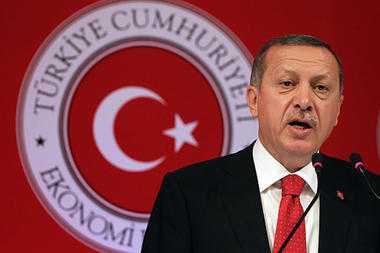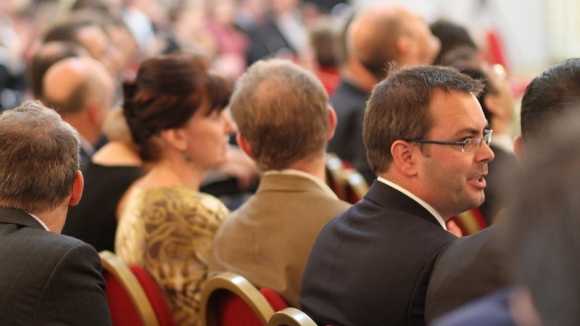Turkey’s Koc Holding has been investigated repeatedly since helping antigovernment protesters this summer. Will that chill investment?
A string of legal and administrative actions against Turkey’s largest business empire has led some to suspect a government vendetta, risking damage to the country’s investment-friendly reputation.
-
In Pictures Turkey’s discontent
Related stories
-
Think you know Turkey? Take our country quiz.
-
Ergenekon case confronts Turkey’s past, but spawns doubts about motives
-
Turkish government hunkers down as world spotlight fades
-
Poll shows Erdogan’s popularity has taken a hit. Could he lose his mandate?
Koc Holding, whose companies account for some 9 percent of Turkey’s GDP, incurred the wrath of Prime Minister Recep Tayyip Erdogan when a Koc-owned hotel sheltered protesters fleeing from police during mass protests in Istanbul in June.
Since then tax authorities have launched probes into two Koc companies, the government has cancelled a contract with one of its firms to build warships, and a university founded by Koc has been threatened with eviction over disputed back rent. Last month a lawyer filed a criminal complaint calling for an investigation into the company’s possible role in the overthrow of Turkey’s first Islamist government in 1997.
While both Koc and Ankara deny any of these measures are politically motivated, analysts say the claims are tarnishing Turkey’s business image at a time when the country badly needs more direct foreign investment.
Since the start of May, the value of the Turkish lira has plunged 11 percent against the dollar, and the Istanbul stock market has lost 14 percent of its value as investors moved their money out of emerging markets like Turkey.
The currency slump has prompted fears over Turkey’s reliance on short term foreign debt. With economists warning that the country needs to attract longer term foreign investment in order to secure itself against the threat posed by further currency devaluations, many are worried about the government’s possible targeting of Koc.
“It seems like revenge, and I believe it’s damaging the image of Turkey’s business environment,” says Ugur Gurses, an economic columnist for the daily Radikal newspaper.
RECOMMENDED: Think you know Turkey? Take our country quiz.
Others remain unconvinced that there is any vendetta. “It is a huge company with many different operations, so hard to say whether it is being disproportionately impacted by regulatory oversight,” says Timothy Ash, head of emerging market research at Standard Bank in London.
Whether or not Ankara’s hand is truly behind the measures against Koc, the perception is that it might be is adding to unease in the business community.
“What we need is direct investment, not loans, and if the government is taking revenge against Koc, this sends out a bad message for our future,” says Gurses.
He believes the alleged targeting of Koc may fade away if more business-oriented minds in Ankara are able to appease Erdogan’s anger against the group.
Chain of events
The controversy surrounding Koc began when the Divan Hotel, close to Istanbul’s Gezi Park, opened its doors to anti-government demonstrators fleeing tear gas and riot police on the night of June 15.
As scores of demonstrators sheltered in the lobby, including a German member of the European Parliament, riot police fired tear gas and a water cannon through its revolving doors. Although the hotel’s management made the decision to shelter the protesters, Koc Holding, which owns the hotel, has supported the decision.
The following day Mr. Erdogan, who has consistently portrayed the demonstrators as violent and criminal, issued the first of a series of veiled threats against Koc.
“We know which hotel owners helped terrorists. Those crimes will not remain unpunished,” he said at a rally of his supporters in Istanbul.
The following month Turkey’s finance ministry launched an investigation into TUPRAS, the largest Koc-owned company and Turkey’s sole oil refiner, and another Koc company, Aygaz, which sells liquefied petroleum gas.
Soon after news broke of the investigations, Turkey’s Finance Minister Mehmet Simsek denied they were politically motivated.
“The Tax Inspection Board conducts 50,000 tax investigations every year. There is definitely no connection between the Gezi incidents and tax investigations,” he wrote in a message on Twitter.
Late last month a $2.5 billion contract to build six corvettes for the Turkish Navy given to another Koc subsidiary, RMK Marine, was unexpectedly canceled after it was awarded in January. The cancellation came after a rival firm that had been excluded from the bidding process filed a complaint with a business standards council within the prime minister’s office claiming the tender had been unfair.
Meanwhile, Turkish media also reported last month that the Ministry of Forestry is preparing to evict a university run by Koc from land the ministry claims to own for failing to pay disputed back rent of about 20 to 30 million Turkish lira ($10 million to $15 million).
The measures evoked comparisons with another incident of alleged government bullying of big business: a $3.8 billion tax fine levied against the Dogan group in 2009. The fine came after newspapers belonging to Dogan, which owns the country’s largest media empire, took an aggressively negative line against Erdogan’s Islamist-rooted government, and the prime minister publicly rebuked owner Aydin Dogan.
A clash of power players
In an interview on Turkish television last month Koc Holding chairman Mustafa Koc, at once dismissed claims that his company was being targeted, but simultaneously defended his hotel’s ‘humanitarian approach’ during the protests.
“Any change [in our investments] or cancellation [in our contracts], to date, is the subject of mere speculation. We want nothing to do with this,” he said.
Koc Holding, founded by Mustafa’s grandfather Vehbi Koc in 1926, is among a clutch of family-owned business empires that make up Turkey’s secular aristocracy.
While they retain much of their former economic clout, the political influence they once enjoyed has reduced dramatically over the past decade in which Erdogan’s Justice and Development Party has governed Turkey.
The newly affluent pious class that has flourished under Erdogan views this old elite with bitter resentment, referring to them by the derogatory term “White Turks” and accusing them of complicity in past state repression of devout Muslims.
On Sept. 16, a lawyer in the conservative city of Erzurum filed a complaint against Koc Holding and Dogan, calling for both to be added as suspects to a criminal case into the fall of Turkey’s first Islamist government in 1997. The trial involved more than 100 military officers accused of using covert pressure to engineer the overthrow of Prime Minister Necmettin Erbakan, an episode now referred to by most Turks as the “postmodern coup.”
The complaint was filed the day after Erdogan made a speech in which he seemed to call for the prosecution of business and media groups he said were involved.
“Wasn’t there a contribution of conglomerates to [the 1997 coup]? Wasn’t there a contribution of print and visual media? I’m astonished that they aren’t on trial. I wonder why they aren’t called to account,” he said in a speech to industrialists in Istanbul.
Mustafa Polat, the lawyer who filed the complaint, told The Christian Science Monitor he had heard Erdogan’s speech before acting, but was not influenced by it.
“Koc and Dogan cooperated with the coup party and they took financial advantage of the situation,” Mr. Polat says, adding that the companies are now being investigated by Turkey’s financial crimes bureau.
Polat is a complainant in the case because he graduated from a religious high school, and following the coup, legal changes barred graduates from these schools from training as lawyers, forcing him to study in northern Cyprus.
“If it wasn’t for the coup, I wouldn’t have had to go there,” he says.
He added that at this stage it is not clear what penalty – if any – the companies could face. But he believes Koc deserves punishment regardless of the economic cost, using a Turkish saying: “The finger feels no pain that is cut off according to Sharia law.”



